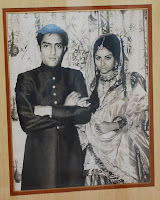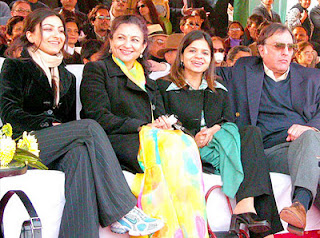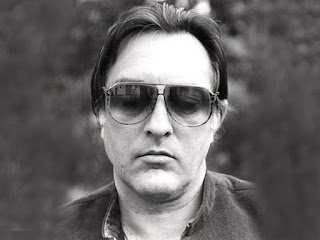Mansur Ali Khan Pataudi, fondly known as Tiger, one of India's greatest cricket captains, passed away at Sir Ganga Ram hospital on Thursday. He died due to respiratory failure leading to cardiac arrest. He was 70.
In an international career spanning 15 years, Pataudi played 46 Tests, scoring 2,793 runs with six Test centuries at an average of 34.91 - all while playing with one good eye. A car accident in July 1961, six months before his Test debut, left the "dazzling" young talent (as cricket magazine Wisden described him) with a severely impaired right eye. No one would ever know what he could have attained with full vision.
But the Nawab of Pataudi still had the eye of the tiger. In his prime, he was a regal middle-order batsman
who relished scoring at a brisk pace and hooking the fastest of bowlers.
 He was also unafraid to step out and play lofted shots against spinners. Pataudi exuded style off the pitch too: his romance and subsequent marriage to Hindi film heroine Sharmila Tagore remains the biggest union of glamour and sports in modern India. They were India's premier Page 3 couple much before Page 3 happened. But above all, he was an astute leader of men. Pataudi was thrust into captaincy mid-series against West Indies in 1962 when only five Tests old and 21 years of age after then-skipper Nari Contractor was struck in his head by a Charlie Griffith delivery that nearly killed him. Pataudi captained India for the next eight years.
He was also unafraid to step out and play lofted shots against spinners. Pataudi exuded style off the pitch too: his romance and subsequent marriage to Hindi film heroine Sharmila Tagore remains the biggest union of glamour and sports in modern India. They were India's premier Page 3 couple much before Page 3 happened. But above all, he was an astute leader of men. Pataudi was thrust into captaincy mid-series against West Indies in 1962 when only five Tests old and 21 years of age after then-skipper Nari Contractor was struck in his head by a Charlie Griffith delivery that nearly killed him. Pataudi captained India for the next eight years.
The Nawab, whose father too played Test cricket, albeit for England, led India to nine victories in 40 Tests. In today's context, such an achievement might appear modest. But as Mihir Bose writes in 'A History of Indian Cricket', "To a nation that for 20 years regarded a draw as a victory, and whose cricket had a certain predictability, he brought the prospect of victory, often unexpected victories, and his captaincy had an element of daring, at times maddeningly unpredictable, so that even when India failed the impression was of having attempted the impossible." Pataudi also dabbled in politics, though not successfully.
 After being replaced as India's cricket captain by Ajit Wadekar in 1971, he contested the Lok Sabha polls from Gurgaon. His party was VHP - Vishal Haryana Party. He lost heavily. Even his second innings as a politician - he contested under a Congress ticket for Bhopal Lok Sabha seat in 1991 - was a failure. His mother belonged to the Bhopal royal family.
After being replaced as India's cricket captain by Ajit Wadekar in 1971, he contested the Lok Sabha polls from Gurgaon. His party was VHP - Vishal Haryana Party. He lost heavily. Even his second innings as a politician - he contested under a Congress ticket for Bhopal Lok Sabha seat in 1991 - was a failure. His mother belonged to the Bhopal royal family.
His association with journalism was more fruitful. For years, he edited the magazine Sportsworld. He also penned his autobiography, 'Tiger's Tale'. Much like his cricket, it was frank and forthright and laced with anecdotes.
Years after retirement, Pataudi retained the aura of a star; his enduring charisma earned him modelling assignments, sometimes with his son, actor Saif Ali Khan. In the photographs, there was no denying he was the bigger and the better-looking star. The Tiger was always burning bright.
In an international career spanning 15 years, Pataudi played 46 Tests, scoring 2,793 runs with six Test centuries at an average of 34.91 - all while playing with one good eye. A car accident in July 1961, six months before his Test debut, left the "dazzling" young talent (as cricket magazine Wisden described him) with a severely impaired right eye. No one would ever know what he could have attained with full vision.
But the Nawab of Pataudi still had the eye of the tiger. In his prime, he was a regal middle-order batsman
who relished scoring at a brisk pace and hooking the fastest of bowlers.
 He was also unafraid to step out and play lofted shots against spinners. Pataudi exuded style off the pitch too: his romance and subsequent marriage to Hindi film heroine Sharmila Tagore remains the biggest union of glamour and sports in modern India. They were India's premier Page 3 couple much before Page 3 happened. But above all, he was an astute leader of men. Pataudi was thrust into captaincy mid-series against West Indies in 1962 when only five Tests old and 21 years of age after then-skipper Nari Contractor was struck in his head by a Charlie Griffith delivery that nearly killed him. Pataudi captained India for the next eight years.
He was also unafraid to step out and play lofted shots against spinners. Pataudi exuded style off the pitch too: his romance and subsequent marriage to Hindi film heroine Sharmila Tagore remains the biggest union of glamour and sports in modern India. They were India's premier Page 3 couple much before Page 3 happened. But above all, he was an astute leader of men. Pataudi was thrust into captaincy mid-series against West Indies in 1962 when only five Tests old and 21 years of age after then-skipper Nari Contractor was struck in his head by a Charlie Griffith delivery that nearly killed him. Pataudi captained India for the next eight years. Under him, India won its first Test series abroad, a 3-1 against New Zealand in 1967-68. Equally importantly, under his tutelage, the famous Indian spin quartet earned their spurs and honed their craft, although the larger rewards came to his successor Ajit Wadekar. "He was a bowler's captain. And he was always cool under pressure," recalls fellow Test cricketer Abbas Ali Baig. It was at Pataudi's insistence that the gifted Gundappa Vishwanath got an early break in Tests. A terrific fielder in the outfield, he was one of the first skippers who emphasized the importance of fielding and worked on improving it. Under him, Indian cricket took its first steps towards the modern age.
The Nawab, whose father too played Test cricket, albeit for England, led India to nine victories in 40 Tests. In today's context, such an achievement might appear modest. But as Mihir Bose writes in 'A History of Indian Cricket', "To a nation that for 20 years regarded a draw as a victory, and whose cricket had a certain predictability, he brought the prospect of victory, often unexpected victories, and his captaincy had an element of daring, at times maddeningly unpredictable, so that even when India failed the impression was of having attempted the impossible." Pataudi also dabbled in politics, though not successfully.
 After being replaced as India's cricket captain by Ajit Wadekar in 1971, he contested the Lok Sabha polls from Gurgaon. His party was VHP - Vishal Haryana Party. He lost heavily. Even his second innings as a politician - he contested under a Congress ticket for Bhopal Lok Sabha seat in 1991 - was a failure. His mother belonged to the Bhopal royal family.
After being replaced as India's cricket captain by Ajit Wadekar in 1971, he contested the Lok Sabha polls from Gurgaon. His party was VHP - Vishal Haryana Party. He lost heavily. Even his second innings as a politician - he contested under a Congress ticket for Bhopal Lok Sabha seat in 1991 - was a failure. His mother belonged to the Bhopal royal family.His association with journalism was more fruitful. For years, he edited the magazine Sportsworld. He also penned his autobiography, 'Tiger's Tale'. Much like his cricket, it was frank and forthright and laced with anecdotes.
Years after retirement, Pataudi retained the aura of a star; his enduring charisma earned him modelling assignments, sometimes with his son, actor Saif Ali Khan. In the photographs, there was no denying he was the bigger and the better-looking star. The Tiger was always burning bright.

Tidak ada komentar:
Posting Komentar